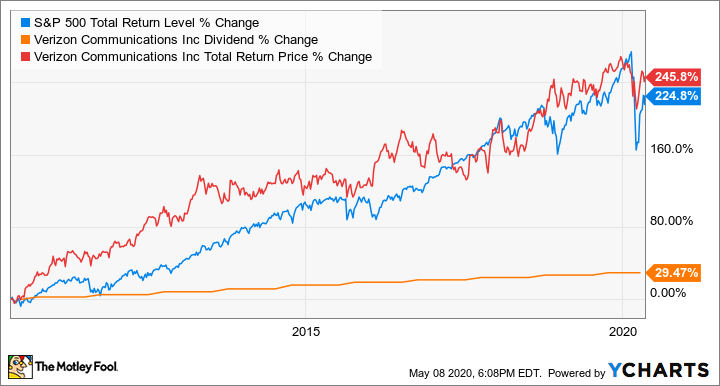Many investors have started sniffing around the oil sector recently, particularly people looking for dividends. Interest rates are at record lows, and for anyone looking for income or just a better return on their cash, it's getting harder to find opportunities.
At the same time, the oil industry is anything but safe right now. None less than Royal Dutch Shell (RDS.B +0.00%)(RDS.A +0.00%), one of the biggest and strongest integrated oil companies on Earth, shocked investors with a 66% dividend cut recently. The lesson there is, if a company with $22 billion in cash decides it needs to cut its payout, there may not be a single dividend in the oil patch that's safe right now.

Image source: Getty Images.
So what's an investor looking for a reliable dividend to do? In short, shop in other, safer aisles. With this in mind, we tapped five of our top contributors who know energy -- and understand the risks -- to offer up five better ideas. The five top names they came up with include three high-yield stocks in Verizon Communications (VZ +0.19%), Nucor (NUE +1.34%), and Williams Companies (WMB 1.26%), and two lower-yield but higher-growth companies -- Brookfield Asset Management (BAM +0.46%) and Mastercard (MA 1.61%).
Keep reading to learn why these five dividend stocks deserve your attention before you even think about investing in oil.
The essential communication service
Travis Hoium (Verizon): Verizon is a much better investment than oil stocks right now. It's one of the biggest telecommunications companies in the U.S. and has an extremely stable business as a result. Unlike oil, communication tools like wireless services have proved to be a very essential service for consumers and businesses during the ongoing coronavirus crisis, and the numbers show that.
Despite the economic downturn brought on by COVID-19, first-quarter 2020 revenue fell just 1.6% to $31.6 billion and adjusted EBITDA -- earnings before interest, taxes, depreciation, and amortization -- was down just 0.1% to $11.9 billion. For 2020, management still expects earnings per share to be flat, plus or minus 2%.
Wireless service isn't quite a consumer staple the way food or housing expenses are, but it's close. And with the combination of Sprint and T-Mobile taking a competitor out of the market just as 5G technology is rolling out, Verizon's business should to be profitable for a long time.
Built to handle challenging markets
Tyler Crowe (Nucor): Challenging operating environments are nothing new to the steel industry. Over the past decade, the industry has been hit with haymaker after haymaker. First, it was the Great Recession; then the Chinese commodity boom (and subsequent bust); then it was illegal steel dumping; and now it's a global economy on pause from the novel coronavirus outbreak. Despite all of the punches the steel market has thrown at Nucor, management has been able to deflect the blows and make a more resilient company each time.
Nucor's business is better able to handle the ups and downs of the steel industry because it is designed to be much more nimble and malleable to the market. The company's mini-mill steel manufacturing methods can be turned on and off with relative ease compared to conventional steelmaking methods. These facilities can also take a wider variety of inputs like recycled scrap to keep material costs low. Also, the company has a profit-sharing compensation plan with all its employees, which makes labor a more variable cost when times are good or bad. On top of that, management maintains a healthy balance sheet that allows them to navigate these ups and downs with greater ease than its peers. In fact, management has typically used market downturns to take market share and acquire competitors.
There's a pretty good chance the steel industry will hit some headwinds because of the economic slowdown we're in. Nucor has seen its fair share of them recently, though, and there are few companies more adept at creating value for shareholders no matter where the market's going than Nucor.
A key cog in the future of payments
John Bromels (Mastercard): When you're able to have a person-to-person meeting, you might pay with physical cash. But as the slogan goes, "for everything else, there's Mastercard."
True, with people staying at home, they aren't pulling out their physical plastic card much, either. But in its Q1 2020 earnings call on April 29, the company revealed that card-not-present (that is, digital) transactions were up more than 40% year over year, accounting for more than half of its "switched volume," which includes the authorization, clearance, and settlement of a transaction. Card-present (that is, in-person) transactions declined sharply, but with much of the economy closed, that's hardly surprising.
MA Dividend data by YCharts
Even now that the stock price has been knocked below $300 a share, Mastercard isn't exactly cheap, trading at 35.7 times earnings -- although that's a cheaper valuation than it's had since 2017. But when a company has a 55% operating margin, as Mastercard did in Q1, not to mention $10.7 billion in cash on its books, plus a huge opportunity for growth in the digital payment space, you can expect to pay a premium.
Mastercard's stock probably won't fully recover until the retail and travel sectors rebound, so now is a great time for long-term investors to pick up shares.
Gas has a better future
Matt DiLallo (Williams Companies): Demand for oil has plummeted this year because governments have restricted commerce and travel to slow the spread of the COVID-19 outbreak. It could take years for consumption to rebound to its prior level, with one airliner believing it could be up to three years before that sector sees a sustainable recovery. In short, oil prices could be under pressure for quite some time.
Natural gas, however, has held up very well. Demand has trended above the three-year average so far this year despite the economic shutdown. Accordingly, gas-focused pipeline giant Williams Companies remains on track with its 2020 outlook, and lower oil prices could benefit the company's gas-producing customers because oil-focused drillers will probably complete fewer wells and produce less associated gas volumes if oil remains under pressure. That could allow gas drillers to boost their volumes, enabling Williams to collect even more fees.
WMB Dividend Yield data by YCharts
Even without that additional upside potential, Williams is a more attractive option than most oil stocks these days. That's because its gas pipelines produce very steady cash flow, which it uses to pay a rock-solid 8%-yielding dividend.
Ready to pounce
Jason Hall (Brookfield Asset Management): While many companies in the oil business will spend the next six months or more struggling to keep afloat, alternative asset manager Brookfield Asset Management is very likely to be an active buyer in the energy space and beyond. The company, with more than $500 billion in assets under management for high-wealth individuals and institutional investors, as well as for individual investors, is built to take advantage of economic downturns to generate market-crushing returns.
BAM Dividend data by YCharts
The company's formula is a product of its focus. In times such as these, investors with the means often look beyond the stock market for opportunities, and Brookfield's reputation as a leader in alternative assets like real estate, infrastructure, and others, is well known. The key to its success is a disciplined investment strategy that the company rarely deviates from. As CEO Bruce Flatt pointed out recently, the company often loses out on deals because of management's refusal to overpay for assets.
The company has billions of dollars in newly raised capital to deploy, while its publicly traded subsidiaries also have plenty of liquidity to tap during the downturn. It will probably be an active investor during the downturn, both in the energy industry, but also across many alternative asset classes where it can find the best bargains. While many oil stocks struggle just to stay afloat during a protracted downturn, Brookfield Asset Management is in an enviable position to go on offense.
For Brookfield shareholders, this winning formula has delivered market-crushing long-term returns, via share price and dividend growth. With shares down 27% from the pre-crash high, now's an excellent time to buy this alternative-asset giant, instead of oil stocks, and hold for the long term.














